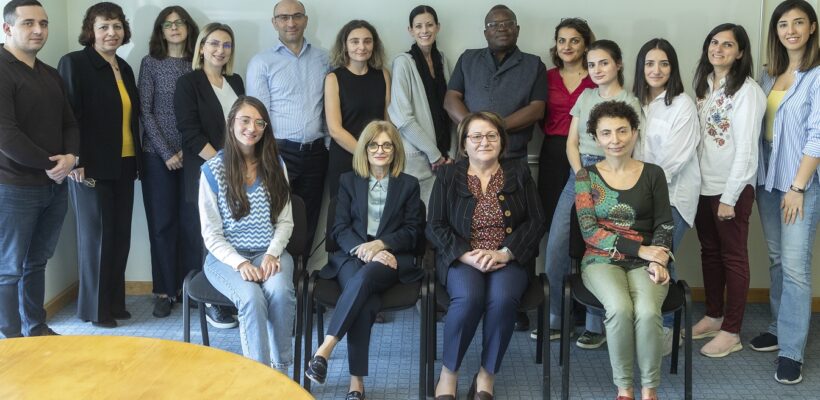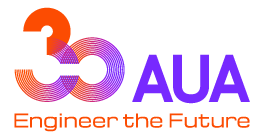YEREVAN—The American University of Armenia (AUA) Turpanjian College of Health Sciences (CHS) is pleased to announce the launch of the Armenia-U.S. Collaboration to Address Chronic Disease via Education in Social Determinants Science (ACCESS) project in partnership with the George Washington University (GWU) Milken Institute School of Public Health. This is a five-year project supported by the U.S. National Institutes of Health Fogarty International Center and builds on the longstanding relationship between CHS and GWU, which encompasses extensive collaboration and joint publications. The principal investigators are Drs. Carla Berg, Nino Paichadze and Varduhi Petrosyan. The co-investigators are Drs. Tsovinar Harutyunyan and Anya Agopian.
“This program reflects Fogarty’s investment in research addressing global health disparities and our team’s commitment to high-impact research in the region. Our team is excited to expand our network of expert researchers in this region and expand the impact of non-communicable disease research,” noted Dr. Carla Berg, professor and associate chair for research in the Department of Prevention and Community Health at GWU.

The primary objectives of ACCESS are to develop a formal non-communicable disease (NCD) prevention and control research training program and institutional infrastructure; advance Armenia’s national NCD research agenda via mentored research among future NCD research leaders; and catalyze NCD-related research dissemination and knowledge translation to inform policy and practice.
“The Fogarty fellowship program is a golden opportunity for me as a student. It provides not only financial assistance, but also professional support, as it prepares me for a successful career. It is a perfect way to gain knowledge by working with leading researchers and scientists and developing fundamental skills. Being part of this program means belonging to a significant and encouraging network that will help to grow and achieve short- and long-term goals,” stated Araz Bourounsouzian, MPH student and Fogarty fellow.
The MPH Fogarty fellowship supported by ACCESS is open to any Armenian citizen with a medical degree (M.D.), dentistry degree (D.D.S. or D.M.D.) or doctorate in science admitted to the CHS Master of Public Health (MPH) program. The target demographic is mid-career professionals working in health organizations or clinics with a desire to strengthen their research skills, present their work internationally and publish. Each selected fellow will receive 100-percent tuition coverage, as well as funds to conduct research on NCD, participate in international scientific conferences and publish their capstone projects in peer-reviewed international journals. AUA welcomed the first cohort of four fellows in fall 2023, with the objective of hosting about 25 fellows in the next five years.
With ACCESS forming an integral part of the MPH program, faculty at AUA and GWU are developing a series of seminars and single-credit courses that are required for Fogarty fellows and elective for other MPH students. Locally, CHS is collaborating with the Ministry of Health, National Institute of Health after Academician S. Avdalbekyan, National Center of Oncology after Fanarjyan, Hematology Center after Prof. R. Yeolyan, Nork-Marash Medical Center, and the Armenian National Center for Disease Control and Prevention. Mentors from these institutions will support the MPH Fogarty fellows in their capstone projects.
“This is a unique and highly regarded program. Besides accommodating Fogarty fellows, it also provides opportunities for selected MPH students to not only get tuition coverage and conduct real research projects on a larger scale than any MPH student could afford otherwise, but also get the opportunity to share their findings with the international professional community. ACCESS is in line with the national health priorities of Armenia and an excellent platform for collaboration with important stakeholders,” added Dr. Petrosyan.
CHS held the inaugural annual meeting for ACCESS on October 9-11, during which faculty members in the college met with fellows and mentors from the aforementioned partner institutions. As part of the three-day event, a select team of GWU faculty members offered a series of seminars open to the community. Dr. Carla J. Berg provided a global overview of the evolving tobacco market and the diversified assortment of alternative tobacco products, including e-cigarettes and heated tobacco products. Her review examined key socio-structural determinants of tobacco use and control particularly pertaining to policy/regulations and industry influences. In turn, Dr. Paul Ndebele highlighted the responsibilities of individual scientists toward society, the environment and animals. He also discussed the responsibilities of the government and institutions in ensuring that scientists can continue to serve as a positive force in society. Also, Dr. Nino Paichadze examined the global burden of road traffic injuries that lead to injuries or disabilities in the millions, predominantly in low and middle-income countries. She highlighted the significant social and economic losses to individuals, their families, societies and countries due to road traffic injuries that are preventable public health problems.
The AUA Turpanjian College of Health Sciences works actively to improve population health and health services in Armenia and the region through interdisciplinary education and development of health professionals to be leaders in public health, nursing, health services research and evaluation, and health care delivery and management.



Has AUA considered establishing a medical school for Armenian students from abroad?